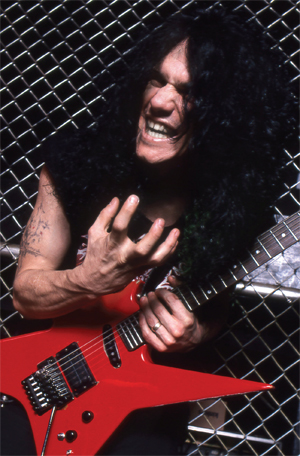Dear Guitar Hero: Trey Azagthoth
All the latest guitar news, interviews, lessons, reviews, deals and more, direct to your inbox!
You are now subscribed
Your newsletter sign-up was successful

He’s the founder of Morbid Angel and a death metal virtuoso who is consistently named one of the best guitarists in his genre. But what Guitar World readers really want to know is…
How did you develop extreme speed in your playing? Were you always a fast player or did you have to consciously work up to it through practice techniques? —Art Martinez
As with any physical skill, it takes time for the muscles to develop that tone and for the mind to achieve that flow state. That’s the whole process of rehearsal, which also helps one develop a core of certainty and confidence that some call “talent.” The real talent would be the passion, dedication and the driving force within one’s self to make it all happen. People can manifest themselves into whatever form they are convinced they can achieve, even if their surroundings are not supportive and agreeable.
How’s the new album coming along? Do you have a title yet and what can we expect it to sound like? Any new tricks up your sleeves? —Bryan Memes
Things are going really well with the material. We’re exploring many new things, pulling from a lot of new musical inspirations and such. There are new kinds of beats, arrangements and, of course, riffing. I think with every record there are always some new structures to be explored.
At times your leads have a chaotic and frenzied attack that sounds very aggressive. How would you describe your methods for formulating your solos? For example, how much of what you do is improvised and how much is composed in advance? And do you have certain scales you like to use? —MetalChick1986
It’s been an evolution, beginning with identifying and connecting with the pure flow of the music I grew up on. I think that back then I used what would be called Creative Visualization: using my mind and my imagination to access a deeper place within myself, to open myself and allow myself to be moved by the vibes coming out of the speakers—not thinking in terms of notes and keys but rather just riding the waves. As with much in life, how we realize music is a personal thing. I “see” stuff coming out of the speakers, and it’s not something I even know how to explain. The things I grew up on moved me. I started out at a place that wasn’t based on theory and patterns but on a free and playful imagination. As the band progressed, I adapted more and more technique, but I still place that original, pure method of experiencing the music first over the externally fabricated filters of rules.
All the latest guitar news, interviews, lessons, reviews, deals and more, direct to your inbox!
I’m 16 years old, and my greatest passion is playing the guitar. I want to play extreme music, but to do this I think I need to live in the U.S., where metal is recognized as a musical genre and people aren’t as close-minded as they are here in Italy. Is the U.S. still the right place to try to be a successful metal musician? —Andrea Riccardo Roman
There are all types of people everywhere, but I guess some places celebrate extreme things more than others. I guess it always helps to have a cool local scene and get started with that, but with the internet we can all instantly have the whole world in our personal room to explore. If you mean that there are not enough extreme musicians in your area to even put a band together, then that would be a problem. I don’t think you need to come all the way to the U.S., though; there are plenty of metalheads all throughout Europe. Try some new ways to make contacts closer to you before you invest in such a big move. Or just go for it. Make a good solid plan and just do it!
Not only is your music fascinating but you also have a really awesome name. What is the origin of Azagthoth? —Hunter Albertson
I first learned of that name with that spelling in the book called The Necronomicon, quite a while ago. [Trey Azagthoth was born George Emmanuel III.] It was one of the first occult type books I experienced, and it inspired me and sent me on an adventure to discover more about such things. Azagthoth is described as the blind idiot god of chaos, which sounds a little dumb, I know. But when you consider the process of observation, what makes sense only does so when it connects with our own reference points—our personal “learned stuff.” So every person’s way of interpreting something depends on where he’s coming from. For a society that finds it more attractive to be led around, the idea of thinking differently and outside the group would be a bad thing, right? But one’s chaos is another’s normality.
It’s the same as with the whole foundation of The Necronomicon itself. It’s from the observations of this one person, and to him the Ancient Ones were so bad. They “moved” in those silent spaces betweens one’s thoughts, during those times when the judges were asleep and not deciding, separating, weighing nor defining.
Back in the early days of Morbid Angel, you and the guys would cut yourselves before going onstage. Is this still a general practice? Also, are there any other rituals you partake in before a show? —Brandon Dent
We did do that, and it was a personal thing—a means of opening up. I don’t advise it, and it’s not really so cool, to be honest. I have no need for it anymore.
As for a current ritual, I just relax and let it all go—clear the clutter and realize that connection-and-flow state. It’s the same for anyone warming up to do something, only the details differ. This is where Creative Visualization plays a big part again.
How are you setting your Eventide processor to get such nice harmony effect? —Michal Jankuliak
Actually, I stopped using my Eventide quite a few years ago when it finally died in battle. For me it was a brilliant piece of gear but not the best thing to take as check-in baggage on airlines. When I used it, I had a few cool programs in it. I used the reverse shift, which was nice for some of those crazy spaz tremolo wah-wah leads. Also, I had one program that had a three-part harmonizing effect, which I used for a couple solos, such as in “Nothing Is Not” and “Secured Limitations.” Mostly I used it for different echo effect programs and mixed that with various stomp boxes, such as the Univibe and MXR Phase 90. I really didn’t use it much as a harmonizer.
What is the best guitar you’ve ever played or owned and why? —William Owings
I would have to say it’s my red B.C. Rich “InstaGIB” Ironbird. That guitar shape fits my body so well, and I totally love the look. It was one of my first guitars, and it has gone through many different configurations.
What is your favorite video game at the moment? —Carl Muttan
I don’t much play video games these days. I don’t own any of the newer consoles. I still like stuff such as Grand Theft Auto Vice City on the PC. What’s most fun with that game is to seriously tweak up the handling of the motorcycle and take it out on the town for some crazy jumps and stunts. That game makes me laugh. I made the vice cop car so fast, and when it comes for you it’s flying, tumbling, screeching and flipping because the game’s AI [Artificial Intelligence] can’t drive it properly.
I read on the internet that you’re into anime. What are some of your favorite anime shows/movies? —Josh Billard
I don’t think I’m as hardcore an anime fan as many people, since I’m really into only a few titles. My faves are stuff like Robotech (Macross), Sailor Moon, Ranma 1/2— stuff like that. Robotech is just brilliant, in my opinion. Sailor Moon is silly yet gets quite interesting with the dialog and the various Agents of the Negaverse.
Are there any guitarists or musicians that have inspired you that may surprise us? —Thom Peyton
I think Carole King’s Tapestry was an amazing record. I love that artist. She has a power to really move the listener deeply. But then it’s all subjective, like with anything else. Funny. Music might come out of the speakers, but it’s put together and realized in the recipient’s mind. I used to always talk about Eddie Van Halen, and he did inspire me in such a big way, but another guitarist who moved me bigtime while growing up was Frank Marino [of Mahogany Rush]. I listen to many types of music, but there are many more types that I ignore.
